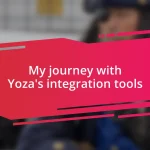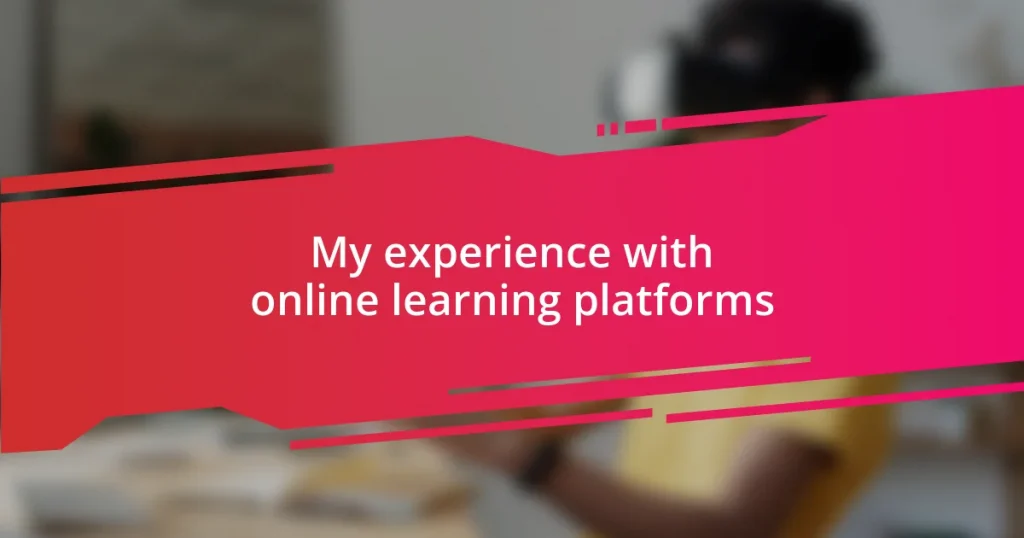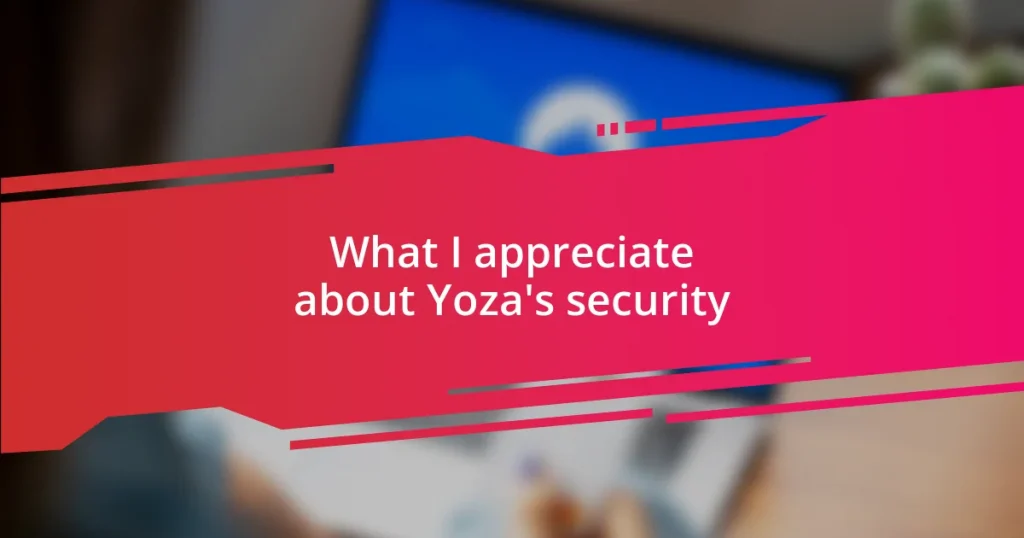Key takeaways:
- Online learning platforms enhance education by offering flexibility, adaptability, and personalized learning experiences that cater to various learning styles.
- Choosing the right platform involves assessing video quality, user interface, course variety, and community support to ensure an engaging learning environment.
- Effective online learning strategies include setting specific goals, creating a dedicated study space, actively engaging with content, and seeking feedback to overcome challenges and maintain motivation.
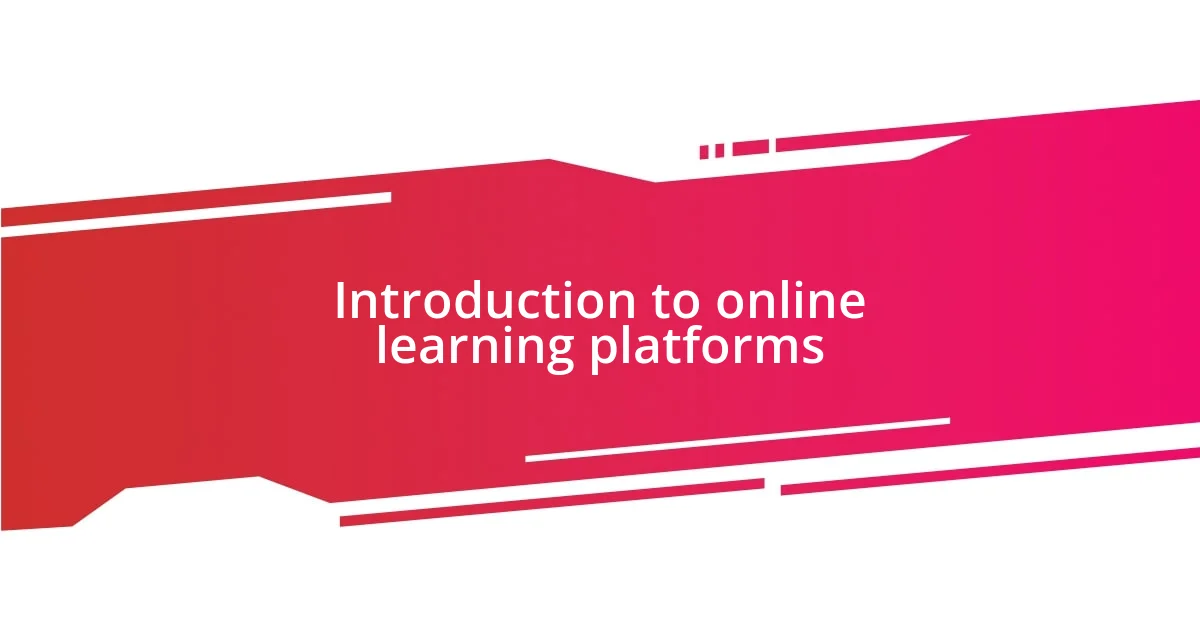
Introduction to online learning platforms
Online learning platforms have transformed the way we access education. I remember the first time I logged into one; it felt like stepping into a vast universe of knowledge at my fingertips. Was it really possible to learn something completely new from the comfort of my home?
These platforms cater to varied learning styles and pace, breaking the traditional classroom mold. I’ve often found that I can absorb information better when I watch a video tutorial or follow interactive modules, which make the learning process feel more engaging. Have you ever felt stuck in a lecture that just didn’t resonate with you?
Moreover, the flexibility of online learning means I can tailor my education around my life. For instance, I vividly recall weekends spent diving into topics I was passionate about, all while sipping my favorite coffee. It felt liberating to pursue my interests on my own terms, and I can’t help but wonder how many others have had that empowering experience as well.

Choosing the right online platform
Choosing the right online platform can feel overwhelming, especially with so many options available today. I remember spending hours comparing features, like video quality, course variety, and community engagement, trying to find the best fit for my learning style. It was a bit like shopping for my favorite coffee blend; the right choice makes all the difference in my experience.
One crucial factor I learned through trial and error is the importance of user interface. When I settled on a platform with an intuitive layout, my stress levels dropped significantly. I recall a time when a confusing interface led to frustration; I wasted valuable hours just navigating rather than actually learning.
Then there’s the element of support. I can’t tell you how comforting it was to have access to responsive instructors and fellow learners. During one course, I remember posting a question and receiving detailed feedback within hours. It solidified my trust in the platform and made me more eager to engage with the material.
| Feature | Platform A | Platform B |
|---|---|---|
| Video Quality | HD | SD |
| Course Variety | Extensive | Limited |
| User Interface | Intuitive | Confusing |
| Community Support | Active | Minimal |
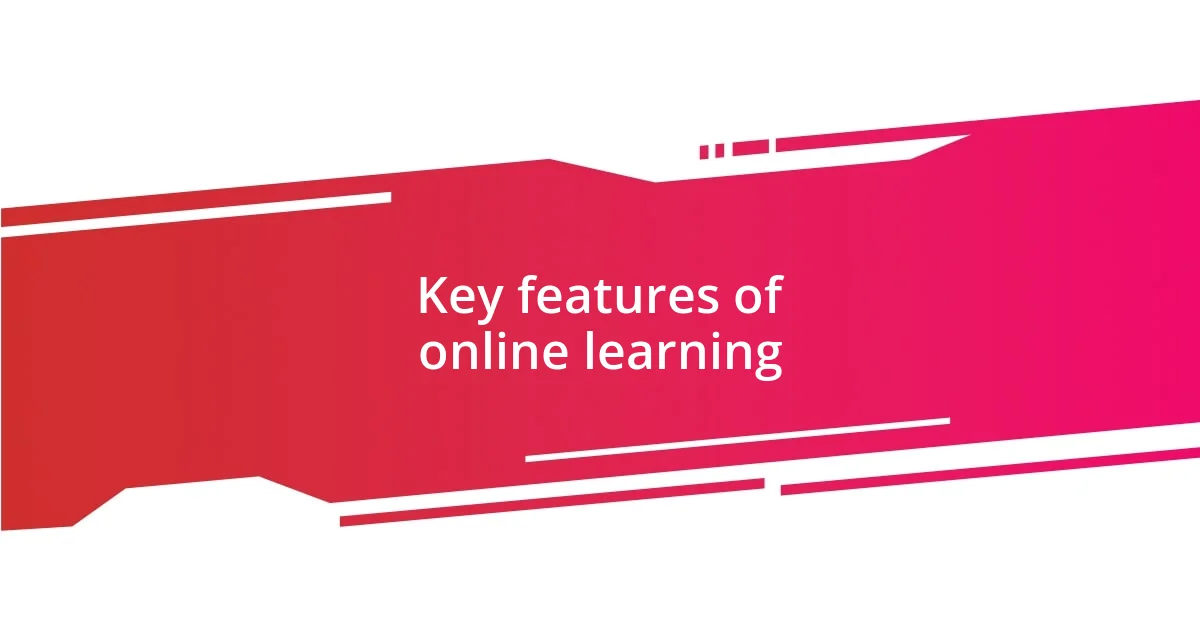
Key features of online learning
Certainly! Here’s a focused exploration of the key features of online learning, enriched with personal insights.
When it comes to online learning, adaptability is a key feature that stands out to me. I remember one night when I found myself completely absorbed in a topic. I could pause, rewind, or revisit sections until I fully grasped the material. This flexibility made learning less intimidating and much more accessible. It’s amazing how the ability to learn at my own pace removed that classroom pressure, allowing me to explore concepts without the fear of falling behind.
Here are some essential features that enhance the online learning experience:
- Personalized Learning Paths: Tailored courses that align with individual goals.
- Interactive Content: Engaging videos, quizzes, and forums that foster active participation.
- Progress Tracking: Tools that allow learners to monitor their advancements and stay motivated.
- Diverse Learning Materials: A mix of resources, such as articles, videos, and podcasts catering to different learning styles.
- Community Engagement: Opportunities to connect with peers for discussions, collaboration, and support.
Reflecting on my experiences, I also appreciate the accessibility of resources. There have been countless times when I was eager to deepen my understanding of a subject. Knowing that a wealth of articles, podcasts, and videos were just a click away was exhilarating. It made the process of acquiring knowledge feel less formal and more like an ongoing conversation with the experts and my peers. Such an inclusive environment encourages curiosity and fosters a sense of belonging in the learning journey.
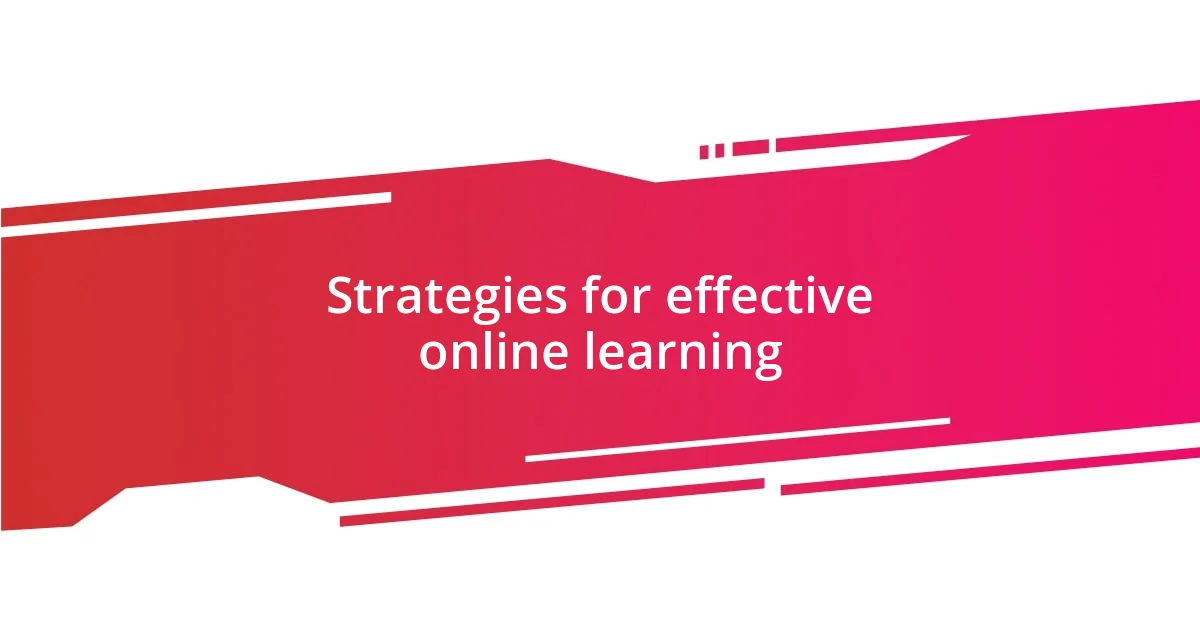
Strategies for effective online learning
One of the most effective strategies I discovered for online learning is setting specific goals. I remember signing up for a course without a clear plan and quickly losing motivation. But once I started outlining what I hoped to achieve each week, everything changed. This small shift helped transform the course from a checkbox on my to-do list into a meaningful journey toward personal development. Have you ever thought about your end goals when learning? I’ve found that it brings a sense of purpose and urgency that keeps me engaged.
In addition to goal setting, creating a dedicated study space plays a significant role in my success. When I established a quiet nook in my home, free from distractions, my focus skyrocketed. It became my sanctuary for learning, and I could immerse myself in the material without interruption. I still recall those afternoons where I dove deep into complex subjects, fueled by the serene environment I curated just for myself. This made all the difference in how effectively I could absorb information.
Lastly, I can’t stress enough the value of actively engaging with the content. I often find that simply passively watching a lecture doesn’t stick. Taking notes, asking questions, and participating in discussions are vital components of my learning process. For instance, during one course, I created a mind map to visualize connections between concepts. It was like assembling a puzzle; the more pieces I fit together, the clearer the picture became. Have you tried any creative methods to deepen your understanding? Trust me, the more involved you are, the more rewarding the experience.
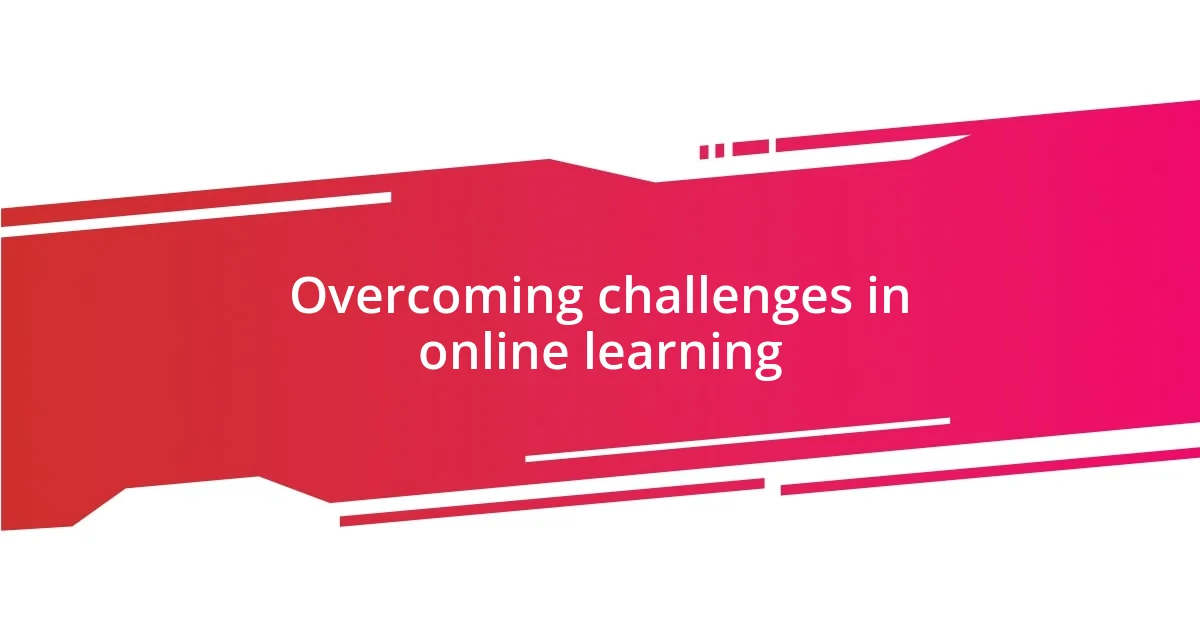
Overcoming challenges in online learning
One major challenge I faced in online learning was the tendency to feel isolated. Initially, I struggled to find a sense of community among my peers. However, I took the initiative to join discussion groups and online forums. Connecting with others doing the same coursework truly transformed my experience. Have you ever felt that sense of camaraderie while learning? I vividly remember the late-night study sessions where we shared insights and motivated each other—it made the whole process feel less solitary.
Another hurdle was the overwhelming amount of information. With endless resources at my disposal, it often felt daunting. I learned the importance of prioritizing and organizing content. Creating a simple schedule helped me filter through the noise and focus on what mattered most. It was empowering to take control over my learning rather than get lost in the vast sea of material. How do you keep your learning organized? For me, using tools like digital planners keeps me grounded and on track.
Lastly, maintaining motivation proved to be a slippery slope. I remember days when I would log in and just stare at the screen, unsure of where to start. To combat this, I began rewarding myself for small achievements. Completing a module would earn me a break, a treat, or even a quick walk outside. This approach turned what could feel like a chore into a rewarding experience. Have you ever tried rewarding yourself during study sessions? It really helps in creating a positive association with the learning process, turning obstacles into stepping stones.
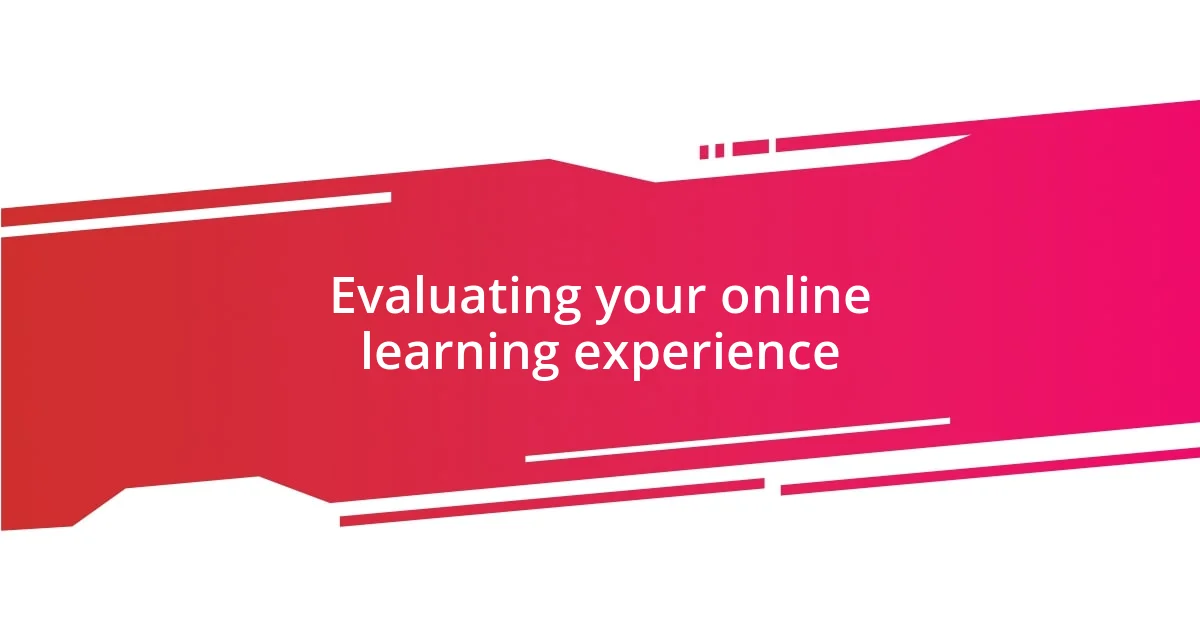
Evaluating your online learning experience
Evaluating your online learning experience can be quite enlightening. Reflecting on what worked and what didn’t provides invaluable insights that shape future learning endeavors. I remember going through my course completion metrics and being pleasantly surprised at how certain modules really clicked for me, while others felt like I was wading through sludge. It’s essential to analyze why that was—is it the teaching style? The content relevance? Getting to the root of these feelings can guide your learning path moving forward.
Another aspect to consider is the feedback you receive. I found that reaching out to instructors or peers for input can highlight strengths and areas for growth. There was a time when I hesitated to share my work, fearing criticism, but when I finally did, the constructive feedback opened my eyes to nuances I hadn’t noticed myself. Have you ever considered how vital feedback is in shaping your learning journey? I’ve come to appreciate it as a catalyst for improvement rather than an obstacle.
Taking the time to document my online learning journey was transformative. I created a simple journal where I noted my thoughts after each session. This practice helped me recognize patterns in my engagement levels and even emotional responses to various topics. There were days when I felt elated after mastering a concept, while other times, I felt overwhelmed. Looking back at those entries now, it’s fascinating to chart my evolution as a learner. Do you keep track of your learning experiences? It’s a reflective practice that uncovers deeper insights into what truly resonates with you as a student.








